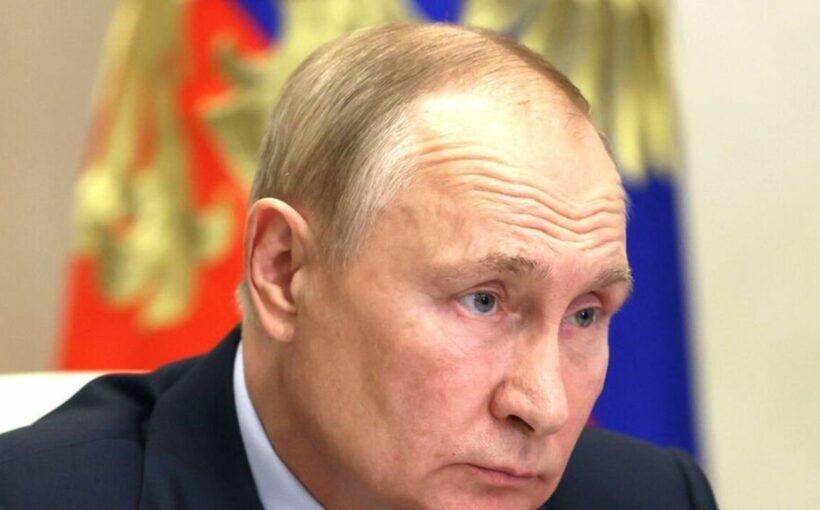Russia: Putin's end 'coming much faster' says Tack
We use your sign-up to provide content in ways you’ve consented to and to improve our understanding of you. This may include adverts from us and 3rd parties based on our understanding. You can unsubscribe at any time. More info
Vladimir Putin’s position as leader of Russia has been put under threat by his failed attempt at invading Ukraine, with the end of his autocracy “coming closer and closer”, an expert has claimed. Military analyst Sim Tack said Putin was “already at the beginning of the end of his reign” prior to the February 24 invasion but the series of failures in Ukraine have “caused anxiety in Russian politics” and infuriated an otherwise largely silent Russian public. He said the “damage that the military failure has done to the political establishment” was evident in the volume of reports of Kremlin infighting.
Mr Tack said: “Putin was already at the beginning of the end of his reign. The fixed date on that, the end of Putin’s eligible terms, is 2036. That’s still some time away.
“But just for context, the period that Russia was entering was already very difficult even without this conflict.
“Demographics, economic development, the expectations of a political system that might not be able to lean on Putin as a personality to manage it, all of those things were coming closer and closer, and causing some anxiety in Russian politics.
“I think all of that is now coming much faster because of the conflict, because of the damage that has done to the Russian economy, the damage that the military failure has done to the political establishment.


“I think, for sure, all of that is coming closer to us but I do not know whether, within the next five years, we should expect some kind of dramatic change, like a coup within Moscow that would be able to unseat Putin.”
The start of the war brought nationalistic pride to the Russian elite, though reports from dissident media outlets suggest many were shocked by the invasion.
But as the war has dragged on, enthusiasm for the war and respect for Putin’s Soviet-style expansionism has waned.
Russian political scientist Abbas Gallyamov, Putin’s former speechwriter who knows his circle first-hand, claimed many of the Russian elite want the war to “end as soon as possible”.

He said: “Most members of the elite are pragmatists. They are determined to bring this all to an end as soon as possible. Without any wins, they are even more convinced that it’s a bad idea.”
And Kremlin infighting has become increasingly rife following a late summer of setbacks and retreats.
The Russian ministry of defence, led by Sergei Shoigu, was heavily criticised by both the Chechen leader Ramzan Kadyrov and the Wagner Group, a squad of mercenary soldiers, leader Yevgeny Prigozhin.
While the Kremlin is often unified behind the single voice of Putin, dissent from the elite shows that this political strategy has been undermined.
Mr Gallyamov said: “‘It is becoming increasingly difficult for the Kremlin to maintain a single media space. All of this feels more and more like a kind of anarchy, almost like a civil war.
DON’T MISS:
Putin planning false flag attack on nuclear plant, Kyiv claims [REPORT]
Putin ‘wants to end war’ but Ukraine has bargaining power – claim [REVEAL]
Putin borrows £11bn in desperate big to prop up flagging war machine [REVEAL]

“The masses are sensing this too, and support for the war is breaking down – fear in society is growing.”
For decades, the Russian autocracy has survived by peddling the idea to its public that if one stays out of politics, they will be left to their own devices. Private expression was tolerable if it meant public displays of dissent were avoided.
But in announcing the mass mobilisation of 300,000 military reservists in late September, Putin has also infuriated the Russian layman.
Hundreds of thousands of Russians, if not millions, fled the country to avoid fighting in a war they had never called for, and private concern quickly became public dissent.
As a result of that, as well as current social upheaval, Russian society has become more confused than ever since the final days of the Soviet Union. Whether Putin is able to ignore or overmine such unrest remains to be seen but appears increasingly unlikely.
READ NEXT:
Russian soldier claims 80,000 Moscow troops died in Ukraine
Iran will aid Russia in Ukraine war with drone weaponry deal
Zelensky’s advisor rules out negotiations as ‘bizarre’
Russian soldier rages during phone call with mum as troop fall ill
Ukraine ‘could reach Crimea by Christmas’ and end war by spring
Source: Read Full Article
